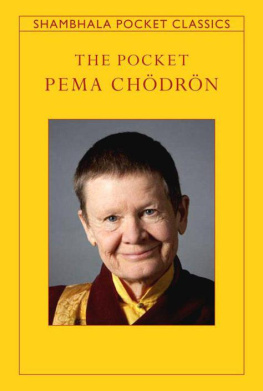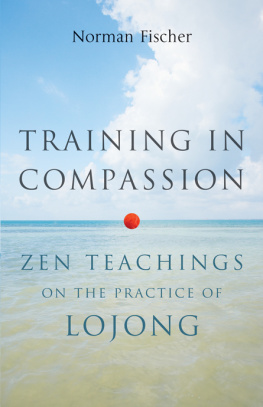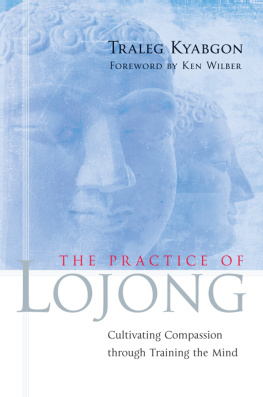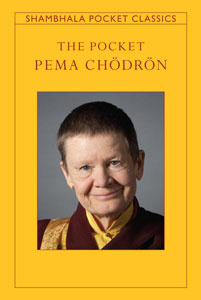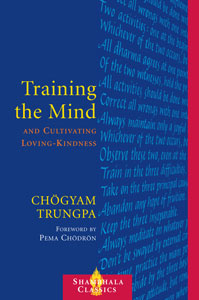SHAMBHALA PUBLICATIONS, INC.
Introduction and commentaries 2003, 2006 Pema Chdrn. Translations of the slogans from The Root Text of the Seven Points of Training the Mind 1993 by Diana J. Mukpo and the Nland Translation Committee.
All rights reserved.
No part of this book may be reproduced in any form or by any means, electronic or mechanical, including photocopying, recording, or by any information storage and retrieval system, without permission in writing from the publisher.
constitutes a continuation of the copyright page.
INTRODUCTION
Training in Loving-Kindness and Compassion
For many years, the fifty-nine slogans that are contained in this book have been the primary focus of my personal practice and teaching. These Tibetan Buddhist slogans (called lojong, or mind-training teachings) offer pithy, powerful reminders on how to awaken our hearts in the midst of day-to-day life, under any circumstances.
The lojong teachings presented in this book come from a classical Tibetan text called The Root Text of the Seven Points of Training the Mind by Chekawa Yeshe Dorje. When I first read these slogans, I was struck by their unusual message: we can use everything we encounter in our livespleasant or painfulto awaken genuine, uncontrived compassion.
The lojong teachings include a very supportive meditation practice called tonglen (taking in and sending out). This is a powerful practice designed to help ordinary people like ourselves connect with the openness and softness of our hearts. Included with this book is a downloadable audio program in which I offer in-depth instruction on tonglen practice. You can download the program at www.shambhala.com/openingtheheart.
The basic notion of lojong is that we can make friends with what we reject, what we see as bad in ourselves and in other people. At the same time, we could learn to be generous with what we cherish, what we see as good. If we begin to live in this way, something in us that may have been buried for a long time begins to ripen. Traditionally, this something is called bodhichitta, or awakened heart. Its something that we already have but usually have not yet discovered.
Its as if we were poor, homeless, hungry, and cold, and although we didnt know it, right under the ground where we always slept was a pot of gold. That gold is bodhichitta. Our confusion and misery come from not knowing that the gold is right hereand from always looking somewhere else. When we talk about joy, enlightenment, waking up, or awakening bodhichitta, all that means is that we know the gold is right here, and we realize that its been here all along.
The basic message of the lojong teachings is that if its painful, you can learn to hold your seat and move closer to that pain. Reverse the usual pattern, which is to split, to escape. Go against the grain and hold your seat. Lojong introduces a different attitude toward unwanted stuff: if its painful, you become willing not just to endure it but also to let it awaken your heart and soften you. You learn to embrace it.
If an experience is delightful or pleasant, usually we want to grab it and make it last. Were afraid that it will end. Were not inclined to share it. The lojong teachings encourage us, if we enjoy what we are experiencing, to think of other people and wish for them to feel that. Share the wealth. Be generous with your joy. Give away what you most want. Be generous with your insights and delights. Instead of fearing that theyre going to slip away and holding on to them, share them.
Whether its pain or pleasure, through lojong practice we come to have a sense of letting our experience be as it is without trying to manipulate it, push it away, or grasp it. The pleasurable aspects of being human as well as the painful ones become the key to awakening bodhichitta.
Working with the Lojong Slogans
The method I suggest is one that was recommended to me by my teacher, Tibetan meditation master Chgyam Trungpa.
Each morning, pick a slogan at random from the book.
Read commentary on that slogan. (In addition to my own comments offered here, you could also consult additional commentaries on the lojong slogans. See the book list in the section for recommendations.)
Try to live by the meaning of that slogan throughout your day.
Sometimes, over the course of a day, I forget the slogan Ive selected. Usually, however, if something challenging arises, the slogan of the day, or perhaps a different one altogether, will come to mind and provide me with valuable on-the-spot instruction. The slogans always introduce me to a bigger perspective, and I begin to gain confidence that I can use them to become less reactive and see things more clearly throughout my life. Even the most difficult of situations have become more and more workable.
I hope that slogan practice will help you, as it has helped me, to transform all circumstances into the path of enlightenment.
T HE L OJONG S LOGANS WITH COMMENTARY
First, train in the preliminaries.
COMMENTARY
The preliminaries are also known as the four reminders. In your daily life, try to:
Maintain an awareness of the preciousness of human life.
Be aware of the reality that life ends; death comes for everyone.
Recall that whatever you do, whether virtuous or not, has a result; what goes around comes around.
Contemplate that as long as you are too focused on self-importance and too caught up in thinking about how you are good or bad, you will suffer. Obsessing about getting what you want and avoiding what you dont want does not result in happiness.



